Keeping the Flame of Cultural Dialogue Alive: 9th Japan-China-Korea Cultural Exchange Forum in the Cities of Niigata and Sado
Chie Maekawa
Asia and Oceania Section, Japanese Studies and Intellectual Exchange Dept., The Japan Foundation
In recent years, relations between Japan and its two neighboring countries, China and Korea, have been marred by tension. Not surprisingly, the deterioration of dialogue between the governments is having an effect on the relations among ordinary citizens of those countries, and many cultural events have either been postponed or cancelled altogether. So the fact that the 9th Japan-China-Korea Cultural Exchange Forum went ahead as scheduled was evidence of the strong awareness of members that these meetings had to take place, and they managed to keep up the momentum of this Forum that has been held every year since 2005.
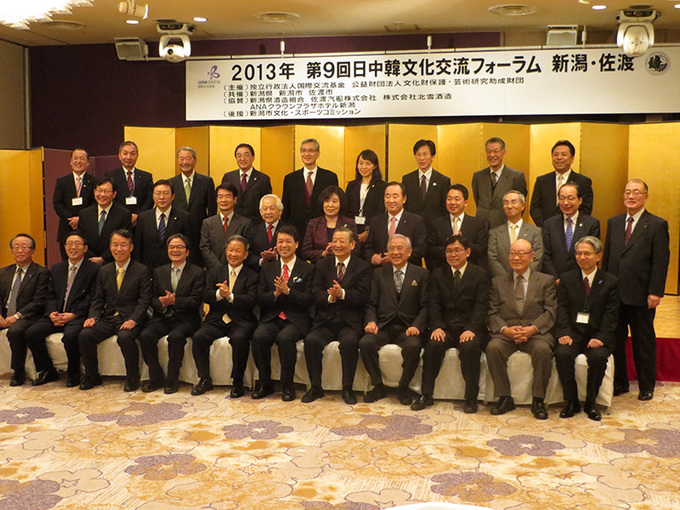
A group photo of the Forum participants, taken at the welcome meeting hosted by Niigata City in Niigata Prefecture (front row, center: Prefectural Governor Hirohiko Izumida)
This Forum is a private-sector led event bringing together former senior government officials and prominent citizens of Japan, China and Korea to promote cultural dialogue on the citizens' level. It was founded in 2005 on the initiative of Japanese nihonga painter Ikuo Hirayama, who chaired the Japan-China Friendship Association and the Japan-Korea Cultural Exchange Association at the time and was a great advocate of peace and friendly relations between Japan and the other countries of Asia. Since then, the three countries have taken turns to hold the annual gathering, and the 2013 event was held in the cities of Niigata and Sado, both in Niigata Prefecture, marking the third time Japan had hosted the event, the earlier ones taking place in Tokyo and Nara.
The theme of the 2013 Forum was "regional cultures and the promotion of international exchange," with committee members of each of the three countries giving reports on their activities.
Growing importance of Niigata as the gateway to East Asia
As a staff member of the Japan Foundation, one of the organizers of the Forum, I would like to give an account of my experience of being involved closely with the Forum from its preparatory stages.
First of all, to understand why the Forum was held this time in the cities of Niigata and Sado, one needs to be aware of the key role played by Niigata in international exchange. Ever since the port of Niigata was opened in the early years of the Meiji period (latter half of the 19th century), it has served as the gateway to the rest of the world on the Japan Sea side of our country. As the importance of East Asia grows with the growth of China and Korea, Niigata is expected to play an even more important role in relations between our three countries.
From a cultural aspect, Niigata is one of the most prominent areas for rice-farming and Japanese sake-producing, as well as being the origins of many cultural treasures that Japan proudly presents to the world.
At the opening ceremony, Liu Deyou, the Forum's Chinese chairperson and director of the China-Japan Friendship Association, surprised the participants by reciting the opening line of Yasunari Kawabata's novel, Snow Country: "Kokkyou no nagai tonneru wo nukeruto, soko wa yuki guni datta (The train came out of the long tunnel into the snow country. [1])." It is reputed that the story takes place in the town of Yuzawa, located deep in the mountains of Niigata Prefecture.
Moreover, Tetsuji Morohashi (1883-1982), who devoted his life to editing Dai Kan-wa jiten (Comprehensive Chinese-Japanese Dictionary), the world's most comprehensive dictionary of kanji (Chinese characters), also hailed from Niigata.
Ever since the Nara Period (AD 710-794), the Island of Sado was known as a place of exile for many famous individuals such as Emperor Juntoku, Buddhist monk Nichiren and Noh playwright Zeami. The exiles were people of culture, prominent intellectuals or aristocrats who had displeased the authorities. They brought with them the culture, ideas, architecture, arts and entertainment of Kyoto, the capital, and the rich heritage remains in Sado to this day. For example, of all the Noh theaters still in use today in Japan, as many as one-third are to be found in Sado. The island is a rich repository of this cultural history.
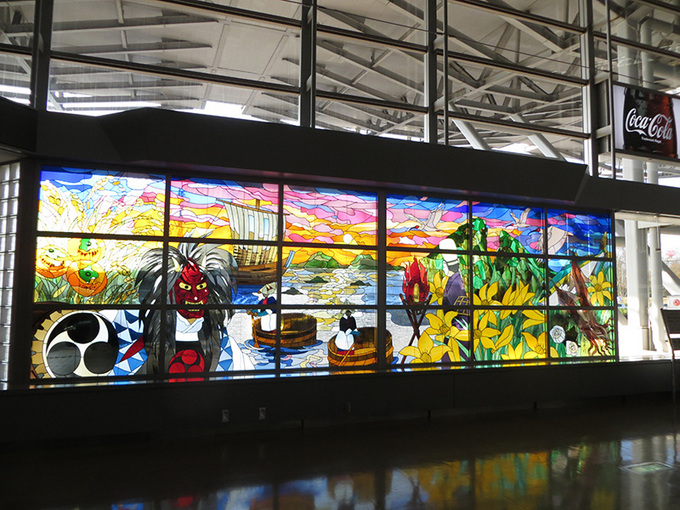
Tale of Sado, stained glass windows at Niigata Airport, created by one of the Forum committee member on the Japanese side, Ryohei Miyata
Regional culture spreading from Niigata and Sado, and prospects for international exchange
There are many examples in Niigata and Sado of how "regional cultures and the promotion of international exchange," the theme of this year's Forum, has been realized successfully. One would be the Echigo-Tsumari Art Triennale, a triannual large-scale international art festival taking place in the town of Tsunan and Tokamachi City in Niigata Prefecture. Kodo, a group playing traditional Japanese drums, holds the Earth Celebration, an annual international performing arts festival, on Sado Island, and this would be another successful case, too. These all represent that the promotion of distinctive features of a certain region in its nature and culture can play a part in revitalizing the region and so enhancing international exchange.
Toshio Kawauchi, the organizer of Earth Celebration mentioned about the festival's concept.
"Having the natural scenery of Sado on the background, I have a vision of strengthening the ties among all the inhabitants of the Earth community by exchanging music and interacting with people from around the world. And we will create a new global culture through mutual understanding, so that we can come one step closer to a world where human beings can live as human beings." (An extract from the Fall 1983 edition of Kodo Quarterly)
This truly embodies the Forum theme. The two examples I have just talked about were also introduced during the Forum and committee members from China and Korea agreed that they could learn a lot from them and mentioned that they would like to carry out similar projects in their own countries.
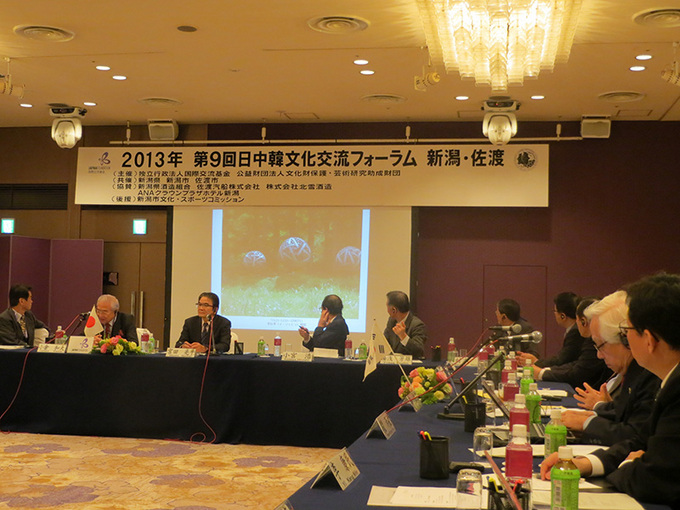
Kazuo Ogura, the Forum's Japanese chairperson and advisor to the Japan Foundation, talks about the Echigo-Tsumari Art Triennale at the main session of the Forum
The scope and depth of the regional culture that we should be truly proud of and the traditions that have been passed down generation to generation
During the course of the Forum, a particularly memorable event where Forum members met local citizens took place at the Kanai Noh Theater in Sado City. At this gathering, performances of ondeko traditional drums and Noh drama were given, and the participants also enjoyed watching children from the Sado Municipal Aikawa Elementary School singing "I am the future" written in the three languages.
The event featured young pupils and students rather than professional artistes, showing that here in Sado, an island far from Kyoto and Tokyo, the traditional performing arts and artistic cultural traditions were not just the monopoly of an exclusive group but widely loved by the people in general. And we wanted our visitors from China and Korea to see how this heritage was being steadily passed down to the next generation. In this aspect, the presence of the local community center housing the Kanai Noh Theater proved that the Noh drama has become an intricate part of people's lives in Sado.
When the children opened the event with the ondeko drum dance, a bright mood filled the hall and smiles broke out on the faces of the Chinese, Korean and Japanese members of the Forum. I felt this was the moment that the audience became conscious of the power of the citizens and understood the fascination of Sado's culture.
Moreover, the students of Niigata Prefectural Sado High School, who showed the Noh dance as vibrant as what professional actors would give, amazed the audience with their energy and beauty. The closing offering was a song familiar to members of all the three countries and by singing it in turn in Chinese, Korean and Japanese, a true feeling of unity was achieved.
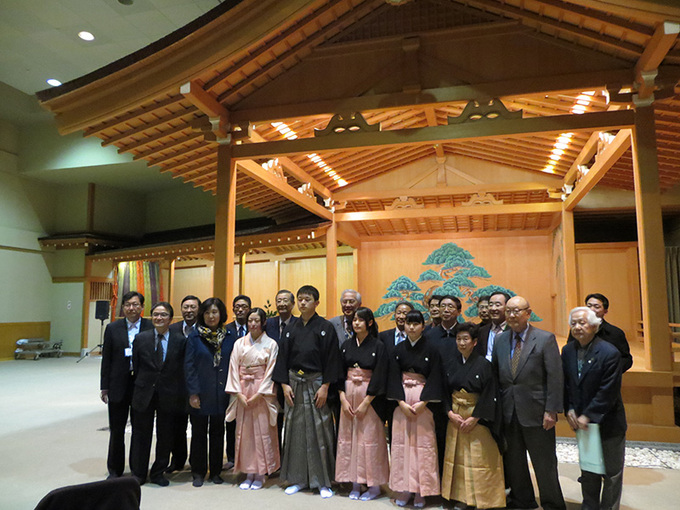
Forum members with students of Niigata Prefectural Sado High School's Noh Club, at the Kanai Noh Theater
The efforts of the local people to participate in cultural exchange gave a deep impression on the Forum committee members from China and Korea. The heads of the Japanese, Chinese and Korean sides wrote the following verses [2] at the end of the Forum.
Japanese chairperson Kazuo Ogura wrote:
海渡る
佐渡の心の
土産かな
Translation:
Venturing across the ocean,
The spirit of Sado.
This is a souvenir.
Chinese chairperson Liu Deyou (director of the China-Japan Friendship Association) wrote:
乘风渡重洋
佐渡民心深似海
情意赛长江
Translation:
Riding on the wind across the distant ocean.
The spirit of the Sado people is as deep as the ocean.
Let our friendship flow for ever like the Yangtze River.
Korean chairperson Chung Ku Chong (Chairman of the Korea Japan Cultural Exchange Council) wrote:
숲에 따오기 날고
땅에는 가슴뛰는 북소리
어린이의 미래 여는 사도의 마음
Translation:
I caught sight of the toki flying through the forest.
How beautifully the earth resounds with the beats of taiko drums!
Sado people open the way to the children's future.
It is the splendid spirit of Sado.
The 9th Japan-China-Korea Cultural Exchange Forum accomplished all the events in an atmosphere of lasting peace and friendship. The organizers experienced numerous trepidations about the running of the events, in view of the current situation where relations between Japan and China, and between Japan and Korea, are far from normal.
But, in fact, none of the worries actually happened and all the events went very smoothly. This was due entirely to the cooperation of the people of the various local organizations that agreed to assist holding the events. Niigata Prefecture and the municipal governments of Niigata and Sado Cities were most generous with their support, for which we would like to extend our heartfelt gratitude.
The difficult issues of historical perception and territorial claims have been putting a strain on relations between Japan, China and Korea. The vicissitudes of politics and diplomacy may damage national sentiments of these three countries and may also burden relations on the civic level. Despite these issues, the committee members of the three countries, with strong determination, have overcome the difficult situation and have maintained the ties, especially in view of the worsening situation, in 2012, between Japan and China over the Senkaku/Diayou islands. Their efforts led to a successful, non-break nine-year record of convening this Forum, and this was a significant achievement.
The most fundamental goal of cultural exchange is to deepen mutual understanding through dialogue, prevent conflicts through mutual respect, and find a road to solve conflicts. In other words, the aim is to build and maintain a peaceful world. In East Asia, especially the present time when the relations between Japan, China and Korea have been unstable, it has become even more vital to encourage exchanges in many different areas, and share our ideas on ways to overcome the problems. In the future, we would like to continuously play our part in achieving the goal by creating even more meaningful exchange endeavors.
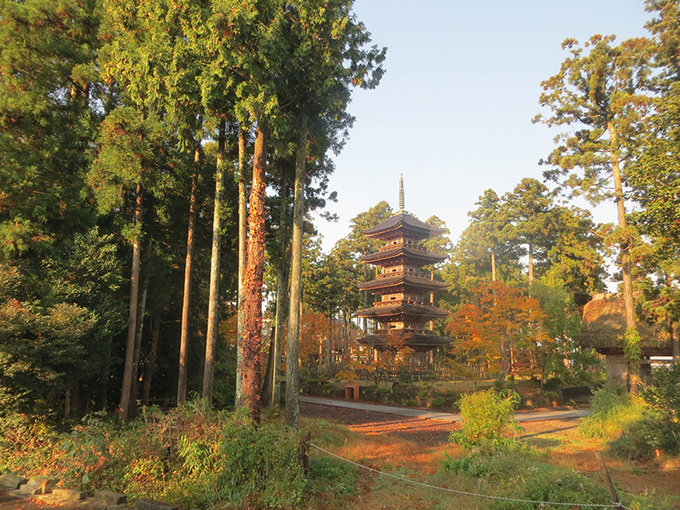
The five-storied pagoda at Abutsubo Myosenji Temple in Sado City, viewed from the bus window
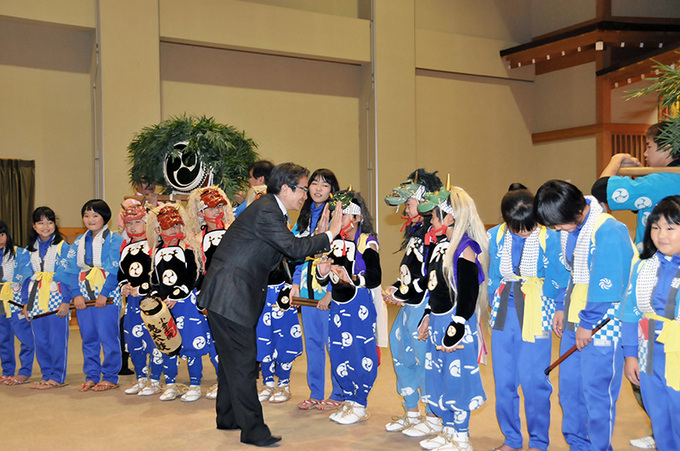
Japanese committee member Ryohei Miyata gives a high five to each member of the children's ondeko drum training group in the Ogura district of Sado (Photo: Shiro Senba)
1. Translation by Edward Seidensticker
2. Translations by the Wochi Kochi Magazine editorial team
Keywords
- Traditional Arts
- Politics
- Cultural Diversity
- Peacebuilding
- Cultural Policy/Public Diplomacy
- Republic of Korea
- China
- Japan
- Japan-China-Korea Cultural Exchange Forum
- Niigata
- Sado
- Japan-China Friendship Association
- Japan-Korea Cultural Exchange Association
- Ikuo Hirayama
- Sake
- Yasunari Kawabata
- Tetsuji Morohashi
- Emperor Juntoku
- Nichiren
- Zeami
- Noh
- Echigo-Tsumari Art Triennale
- Kodo
- Earth Celebration
- Toshio Kawauchi
- Kanai Noh Theater
- Ondeko
- Sado Municipal Aikawa Elementary School
- Niigata Prefectural Sado High School
- Senkaku/Diayou islands
Back Issues
- 2024.3. 4 Movie Theaters aroun…
- 2023.4.10 The 49th Japan Found…
- 2023.3.28 JF's Initiatives for…
- 2023.1.27 Living Together with…
- 2022.11.16 Inner Diversity <…
- 2022.6.21 The 48th Japan Found…
- 2022.3.22 JF's Initiatives for…
- 2022.3.14 JF's Initiatives for…
- 2022.2.14 JF's Initiatives for…
- 2022.2. 4 JF's Initiatives for…

